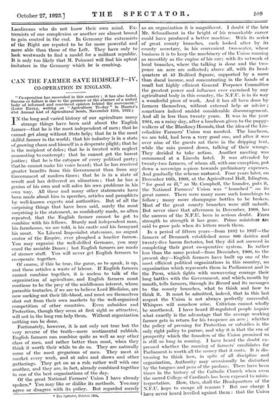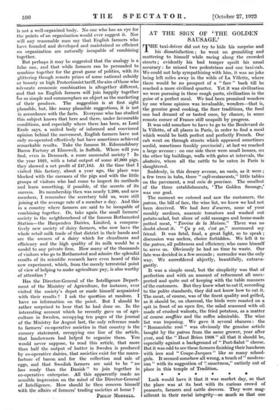CAN THE FARMER SAVE HIMSELF ?—IV.
CO-OPERATION IN ENGLAND.
" Co-operation has succeeded in this country ; it has also failed. Success or failure is due to the presence or the absence of a united body of informed and convinced opinion behind the movement." (Loan ERN LE, writing on " Agriculture To-day " in Hunter's 41st Annual List of Agricultural Seeds, November 15th, 1922.)
IN the long and varied history of our agriculture many strange things have been said about the English farmer—that he is the most independent of men; that he cannot get along without State help; that he is the most skilful farmer in the world; that his industry is in a state of growing chaos and himself in a desperate plight; that he is the recipient of doles; that he is treated with neglect amounting to contempt; that he cannot get the barest justice; that he is the catspaw of every political party; that he cannot make his voice heard; that he has received greater benefits from this Government than from any Government of modern times; that he is in a state of revolt and has delivered an ulimatum ; that he has a genius of his own and will solve his own problems in his own way. All these and many other statements have been made about him in speeches, articles and pamphlets by well-known experts and authorities. But of all the surprising things that have been said, surely the most surprising is the statement, so confidently made, so often repeated, that the English farmer cannot be got to combine with his fellows. Sturdy and independent man, his farmhouse, we are told, is his castle and his farmyard his moat. No Liberal Imperialist statesman, no august orator of the Empire, ever ploughed a lonelier furrow. You may organize the well-drilled Germans, you may enrol the amiable Danes ; but English farmers are made of sterner stuff. You will never get English farmers to co-operate together.
Of course, if this be true, the game, so to speak, is up, and these articles a waste of labour. If English farmers cannot combine together, it is useless to talk of the organization of agriculture, and English farmers must continue to be the prey of the middleman interest, whose parasitic tentacles, if we are to believe Lord Bledisloe, are now sucking out their life-blood, and must see themselves shut out from their own markets by the well-organized competition of other countries. Even subsidies and Protection, though they seem at first sight so attractive, will not in the long run help them. Without organization nothing can be done.
Fortunately, however, it is not only not true but the very reverse of the truth—mere sentimental rubbish. English farmers can combine quite as well as any other class of men, and rather better than most, when they think it worth their while to do so. They are naturally some of the most gregarious of men. They meet at market every week, and at sales and shows and other gatherings. They get on as a rule rather well with one another, and they are, in fact, already combined together in one of the best organizations of the day.
Of the great National Farmers' Union I have already spoken.* You may like or dislike its methods. You may agree or disagree with its policy. But regarded merely • The Spectator, October 13th. as an organization it is magnificent. I doubt if the late Mr. Schnadhorst in the height of his remarkable career could have produced a better machine. With its series of great county branches, each looked after by its county secretary, in his convenient two-seater, whose business it is to keep the machinery of the Union running as smoothly as the engine of his car; with its network of local branches, where the talking is done and the two- pence an acre are collected ; above all, with its head- quarters at 45 Bedford Square, supported by a more than ducal income, and concentrating in the hands of a small but highly efficient General Purposes Committee the greatest power and influence ever exercised by any agricultural body in this country, the N.F.U. is in its way a wonderful piece of work. And it has all been done by farmers themselves, without external help or advice ; sometimes indeed amidst considerable discouragement. And all in less than twenty years. It was in the year 1904, on a rainy day, after a luncheon given to the puppy- walkers of the Blankney Hounds, that the idea of the Lin- colnshire Farmers' Union was mooted. The luncheon, we are told, had been a very good one, and after it was over nine of the guests sat there in the dripping tent, while the rain poured down, talking of their wrongs. They decided to take action. Another meeting was summoned at a Lincoln hotel. It was attended by twenty-two farmers, of whom all, with one exception, put down a sovereign a-piece towards preliminary expenses. And gradually the scheme matured. Four years later, on December 10th, 1908, at the Agricultural Hall, Islington, " for good or ill," as Mr. Campbell, the founder, puts it, the National Farmers' Union was " launched " on its great career. There were many more such launchings to follow ; many more champagne bottles to be broken. Most of the great county branches were still unbuilt. But never since that afternoon in December, 1908, has the success of the N.F.U. been in serious doubt. From strength to strength it has gone. Prime ministers Are said to grow pale when its letters reach them.
In a period of fifteen years—from 1882 to 1897—the farmers of Denmark established sonic 800 dairies and twenty-five bacon factories, but they did not succeed in completing their great co-operative system. In rather less than the same period—from December, 1908, to the present day—English farmers have built up one of the most efficient political organizations in this country, an organization which represents them in Parliament and in the Press, which fights with unwavering courage their long battles with the Government, and which, month by month, tells farmers, through its Record and its messages to the county branches, what to think and how to think it. It must be admitted, indeed, that in this last respect the Union is not always perfectly successful. Whispers will somehow arise. Criticism cannot wholly be smothered. I have heard ill-regulated people inquire what exactly is the advantage that the average working farmer gets in return for his twopence an acre ; whether the policy of pressing for Protection or subsidies is the only right policy to pursue, and why it is that the era of prosperity which the founders of the Union promised us is still so long in coming. I have heard the doubt ex- pressed whether the running of farmers' candidates for Parliament is worth all the money that it costs. It is dis- tressing to think how, in spite of all discipline and organization, Authority may occasionally be disturbed by the tongues and pens of the profane. There have been times in the history of the Catholic Church when even the sacred College of Cardinals has been exposed to misin- terpretation. How, then, shall the Headquarters of the N.F.U. hope to escape all censure ? But one charge I have never heard levelled against them ; that the Union is not a well-organized body. No one who has an eye for the points of an organization would ever suggest it. Nor will any reasonable man say that English farmers who have founded and developed and maintained so efficient an organization are naturally incapable of combining together.
But perhaps it may be suggested that the analogy is a false one, and that while farmers can be persuaded to combine together for the great game of politics, with its glittering though remote prizes of some national subsidy or bounty or high Protectionist tariff, the aim of those who advocate economic combination is altogether different, and that no English farmers will join happily together for so simple and commonplace an object as the marketing of their produce. The suggestion is at first sight plausible, but, like many plausible suggestions, it is not in accordance with the facts. Everyone who has studied this subject knows that here and there, under favourable conditions, and especially where there has been, as Lord Ernie says, a united body of informed and convinced opinion behind the movement, English farmers have not only co-operated effectively but have sometimes achieved remarkable results. Take the famous St. Edmundsbury Bacon Factory at Elmswell, in Suffolk. Where will you find, even in Denmark, a more successful society ? In the year 1921, with a total output of some 47,000 pigs, they showed a net profit of £47,185. At the time that I visited this factory, about a year ago, the place was blocked with the carcases of the pigs and with the little groups of visitors who had come to inspect its methods and learn something, if possible, of the secrets of its success. Its membership then was nearly 1,200, and new members, I remember the secretary told us, were still joining at the average rate of a member a day. And this in a country where farmers are said to be incapable of combining together. Or, take again the small farmers' society in the neighbourhood of the famous Rothamsted Station—the Harpenden Dairies, Limited, a compara- tively new society of dairy farmers, who now have the whole retail milk trade of that district in their hands and are the owners of a dairy which for cleanliness and efficiency and the high quality of its milk would be a model to any private firm. How many of the thousands of visitors who go to Rothamsted and admire the splendid results of its scientific research have even heard of this new experiment, which, from the merely terrestrial point of view of helping to make agriculture pay, is also worthy of attention ?
Has the Director-General of the Intelligence Depart- ment of the Ministry of Agriculture, for instance, ever visited the society's depot or made himself acquainted with their results ? I ask the question at random. I have no information on the point. But I should be rather surprised to hear that he had done so. In the interesting account which he recently gave us of agri- culture in Sweden, occupying ten pages of the journal of the Ministry for August last, the only reference made to farmers' co-operative societies in that country is the cursory statement, occupying one line of the article, that landowners had helped to organize them. You would never suppose, to read this article, that more than half the output of .butter in Sweden is produced by co-operative dairies, that societies exist for the manu- facture of bacon and for the collection and sale of eggs, and that Swedish farmers are said to be " no loss ready than the Danish " to join together in co-operative enterprise. All this apparently made no sensible impression on the mind of the Director-General of Intelligence. How should he then concern himself with the affairs of farmers' trading societies at home
PHILIP MORRELL.















































 Previous page
Previous page